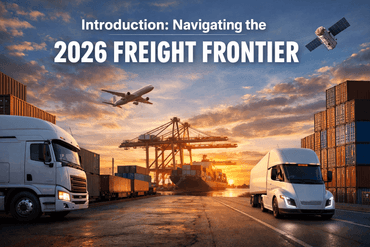
Air Freight Security Screening: What Shippers Need to Know



In the fast-moving world of global logistics, air freight security screening plays a critical role in ensuring safe, timely, and compliant shipments. For small to medium-sized enterprises (SMEs) operating in sectors such as fashion, consumer electronics, food, or holiday goods, efficiently managing this part of the shipping process can make or break a seasonal campaign. But understanding what’s required—and what’s at stake—isn’t always straightforward.
Security screening requirements vary by destination, product type, and carrier. Left unaddressed, they can introduce unnecessary delays, inspection fees, and missed delivery windows. This article walks through the essentials of security screening in air cargo, the hidden risks, and how shippers can prepare their freight to move smoothly and cost-effectively through this critical checkpoint.
1. Understanding Air Freight Security Screening
Security screening is mandatory for all cargo traveling via commercial air. These checks are designed to prevent illicit or dangerous materials from entering the supply chain. Regulations are enforced globally through organizations such as the Transportation Security Administration (TSA) in the U.S., the International Air Transport Association (IATA), and various local customs and border agencies.
Standard screening methods include:
- X-ray machines for visual inspection of palletized or loose cargo
- Explosive Trace Detection (ETD) devices for sampling residues
- Manual inspections for high-risk or flagged shipments
- Canine screening in some jurisdictions
Security protocols may differ by country or airline, but non-compliance almost always results in costly delays, repackaging, or denial of carriage.
2. The Impact of Security Screening on Air Freight Shipments
Security isn’t just a regulatory requirement—it directly affects your bottom line. Poor preparation for screening procedures can result in:
- Delays at departure hubs, particularly during peak shipping seasons
- Additional handling or inspection fees
- Storage charges while awaiting clearance
- Missed delivery deadlines, damaging customer trust
During high-demand periods, when air freight networks are stretched thin, inspection backlogs are common. And for SMEs working with tight margins and seasonal inventory cycles, even a one-day delay can mean lost sales and excess carrying costs.
3. Best Practices to Minimize Security Screening Delays
Avoiding delays starts with understanding how to prepare your shipments for smooth transit through security checkpoints. Here are some essential best practices:
- Ensure proper documentation: Incomplete or inconsistent paperwork is one of the top causes of flagged shipments. Make sure all commercial invoices, airway bills, and security declarations are complete and accurate.
- Label and package correctly: Poorly labeled or damaged goods are more likely to be pulled for secondary screening.
- Pre-screen when possible: Programs like the TSA Known Shipper Program or Cargo Secure Programs in other regions can allow pre-screening of trusted cargo, reducing the risk of delay.
- Understand destination-specific regulations: Certain countries have heightened restrictions, particularly for food, electronics, or battery-powered devices.
Being proactive about compliance reduces the likelihood of secondary screening or rejection, helping your cargo stay on schedule.
4. Strategic Planning for Security Screening
Planning gives you the flexibility to deal with potential bottlenecks—especially when security screening is involved.
Smart planning tips:
- Book air freight well in advance of peak periods to secure space and give screening facilities enough lead time.
- Stagger high-volume shipments across multiple days to avoid all your goods getting stuck in a single screening backlog.
- Build screening time into your delivery schedule so that short delays don’t disrupt your downstream commitments.
- Avoid last-minute bookings, which often skip critical steps or incur additional rush charges if screening reveals issues.
When your cargo moves faster through security, you gain more predictability and control over your supply chain.
5. Partnering with the Right Freight Provider for Smooth Screening
Experienced freight forwarders don’t just move your cargo—they guide it through a highly regulated process with fewer surprises. The right partner will:
- Understand the full range of security screening regulations
- Advise on compliant documentation and packaging
- Use digital tracking tools to alert you about hold-ups or inspections
- Suggest alternate routing or timing if congestion is expected
Your partner should also maintain close contact with screening authorities and have direct access to airport cargo facilities—ensuring your freight receives priority handling when needed.
For example, iContainers offers integrated air freight services that include customs and security compliance support, helping SMEs avoid costly mistakes at critical checkpoints.
Air Freight Security Screening and Supply Chain Success
Understanding and preparing for air freight security screening is no longer optional—it’s essential. As cargo volumes rise and regulations tighten globally, SMEs must take a strategic approach to minimize delays and cost disruptions caused by security compliance.
By focusing on accurate documentation, proactive planning, compliant packaging, and working with the right freight forwarder, your business can ensure that air freight shipments pass smoothly through security. The result? Faster deliveries, fewer surprises, and greater confidence in your ability to meet seasonal or high-volume demand—without sacrificing profitability.
Need help navigating air freight security regulations? Start with a trusted freight partner that understands your industry and offers tailored support every step of the way.
- 1. Understanding Air Freight Security Screening
- 2. The Impact of Security Screening on Air Freight Shipments
- 3. Best Practices to Minimize Security Screening Delays
- 4. Strategic Planning for Security Screening
- 5. Partnering with the Right Freight Provider for Smooth Screening
- 6. Air Freight Security Screening and Supply Chain Success
Related Articles


